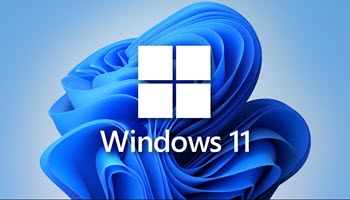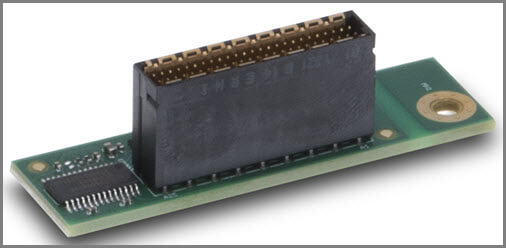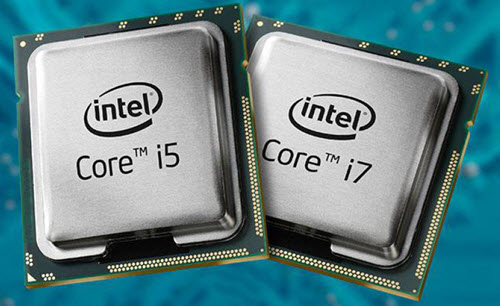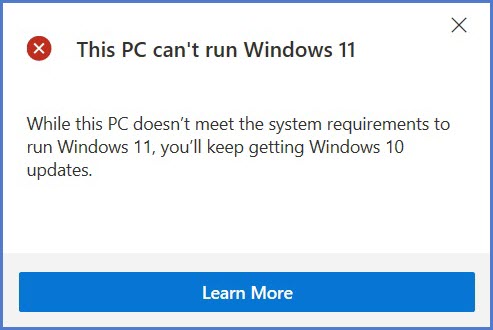A lot has been written about Windows 11 but what many pundits are missing are the technical requirements needed to upgrade to Microsoft’s new operating system which are causing quite a deal of confusion. Microsoft lists system requirements for Windows 11 as follows (source):
- Processor: 1 gigahertz (GHz) or faster with two or more cores on a compatible 64-bit processor or system on a chip (SoC)
- RAM: 4 gigabytes (GB) or greater
- Storage: 64 GB or greater available storage is required to install Windows 11
- Graphics card: Compatible with DirectX 12 or later, with a WDDM 2.0 driver
- System firmware: UEFI, Secure Boot capable
- TPM: Trusted Platform Module (TPM) version 2.0
- Display: High definition (720p) display, 9″ or greater monitor, 8 bits per color channel
- Internet connection: Internet connectivity is necessary to perform updates, and to download and use some features
- Windows 11 Home edition requires an Internet connection and a Microsoft Account to complete device setup on first use
Okay, now let’s take a closer look at a couple of these requirements.
Trusted Platform Module
TPM (Trusted Platform Module) is a security protocol that is generally included either as a separate chip on the motherboard or via firmware and is enabled/disabled via a setting in BIOS. Pretty much all PCs manufactured since 2016 support TPM. However, PCs manufactured pre-2016 can be iffy. My main PC which was built around 7-8 years ago, for example, does not include any form of TPM. There are already workarounds published on the web to help overcome this requirement, the simplest of which suggests replacing the appraiserres.dll file in the Sources folder of the Windows 11 ISO with the appraiserres.dll file from the Sources folder in a Windows 10 ISO. However, that is yet to be 100% confirmed.
To check if TPM is enabled, open a Run box (press the Windows + R keys), type tpm.msc into the Run dialogue box and hit Enter.
If this results in a Compatible TPM cannot be found message, that doesn’t necessarily mean your PC does not support TPM. TPM might be disabled in BIOS, in which case you’d need to enter BIOS, locate the setting, and enable it.
Compatible 64-bit Processor
You will notice that I have highlighted compatible 64-bit processor under Processor at the top of the above list of requirements, and there is a very good reason for that. Windows 11 supports Intel “i” series processors only from 8th generation and upwards, which means that any machines running Intel “i” series processors older than 8th generation cannot be upgraded to Windows 11. My machine is running an Intel i5 4th generation processor, so cannot be upgraded. There is absolutely no workaround for this limitation that I can think of, other than to replace the perfectly good CPU with a newer CPU or purchase a new machine already fitted with a newer CPU. Similar restrictions apply for AMD processors.
Windows 11 Home Edition Requires Microsoft Account
I am pretty sure that this requirement applies only to the installation process and once Windows 11 is fully installed the user should then be able to switch to a local account. However, I would not swear to that as being gospel. I also have no idea if this is referring to an upgrade installation (where Windows 10 is already set up with a local account) or to a clean install only. Confusion indeed.
BOTTOM LINE
While the increases in hardware requirements for Windows 11 (over and above Windows 10) are minimal and should not affect too many users, the other requirements as outlined above, TPM and supported/compatible processors, are sure to prevent a lot of users from upgrading to Windows 11, including yours truly.
Considering Microsoft’s previous huge push to get as many users as humanly possible working with the same Windows version, this seems an unbelievable change in direction and one that is sure to force a lot of users to either stick with Windows 10 or upgrade their hardware to meet these new requirements. Seems to me that, with Windows 11, Microsoft is working in collusion with hardware manufacturers to help boost PC sales.
- To see if your PC meets the necessary requirements to install Windows 11 you can download and install the Windows PC Health Check app (scroll down to the bottom of the page for the download link).
NOTE: Reports have been filtering through that the PC Health Check app is not terribly accurate nor is it indicating any reasons as to why a PC is failing the requirements test. A Microsoft representative has subsequently apologized for “the irritating experience” and announced that the company is working on improving the app with new improved versions rolling out over the coming weeks. Oh boy, can Microsoft get anything right?!
This situation is all very fluid at the moment and subject to change. I, for one, certainly hope that Microsoft sees common sense and adjusts these silly requirements so as not to exclude users running older yet perfectly adequate healthy machines from upgrading to Windows 11. I will not be holding my breath, however.
—





Leaves my PC’s out!!!!
Mine too Daniel. I have two machines that are well and truly powerful enough to run Windows 11 but cannot because of a couple of Microsoft’s ridiculous limitations. Hopefully, if others in the same boat create enough of an uproar, MS might repent, but I doubt it.
Brings back old memories of XP and all that hardware upgrade. Feel a little lucky my latest desktop with 10 preinstalled meets the guidelines. But I also remember the horrors I experienced with my free upgrade from 8.1 to 10. After 6 months reverted back to 8.1
Now that customers are being used as bug testers, believe it safer to wait and avoid the rush.
Windows 8.1 expires on January 10, 2023 and Windows 10 expires on October 14, 2025 with plenty of time to enjoy what we have, Mindblower!
OK, but XP will still run on my old hardware!!!!
I believe Mindblower is referring to the hardware upgrades required moving from XP to Vista. I was very fortunate to have just purchased a new PC with improved specs at that time.
Trouble is MB, I need to have Windows 11 installed somewhere so I can write articles about it. If it wasn’t for that aspect I wouldn’t be bothered.
Is it possible that as time goes on, ms will add more hardware to acceptable list?
Steve,
That’s what I’m hoping too!
My Windows PC is only 2 years old & easily achieves all the other criteria EXCEPT for the compatible processor (Intel J-series, of which only one currently appears on the MS list…!)
Fingers
Paul
Hi Steve,
It is possible, especially as more and more users join the chorus of protest.
Hi Jim,
After all the Microsoft hoo-haa abouit Windows 10 being the final version, then Windows 11 is about to arrive that will be useless to many early Windows 10 users.
Could this be a reason to sell more of their own product which will surely be Windows 11 compatable.
Maybe MS want to be involved in sport, a Windows X1 cricket team. :-<
Regards,
Jonno
Something is happening…. I just clicked on to the Windows 11 link page and wanted the test it has vanished… Is it April 1st again for Microsoft?
——————————————————
Check for compatibility
Use the PC Health Check app to see if your current PC meets the requirements to run Windows 11. If so, you can get a free upgrade when it rolls out.
COMING SOON
—————————————————————
Hey Jonathan,
MS took the PC Health Check app down as it was buggy and giving out inaccurate results. It will reappear once they have fixed it.
I sometimes wonder if I am going senile….. I actually trust Microsoft with running my computers and they aren’t even capable of doing adequate checks on their own update checker….
I used to run a print shop and one of the biggest most time consuming parts of the job was proof reading which often included checking customer’s grammar, spelling and sometimes translating from other languages to English. We were a back street printers employing four people at our biggest.
Surely Microsoft have the resources to check their own software before ‘publishing’ it? They make enough profit…
I may even check out Linux again – the trouble is that in the past I have wanted an operating system and Linux was always another time consuming hobby.
I don’t know what to think.
I get sometimes progress is needed and sometimes this means leaving people behind. However I think right now maybe this isn’t the best time. A lot of people have felt the effects of Covid financially, and it just seems a bad time to make an OS that a lot of people won’t be able to use without upgrading hardware.
My computer is an i7 from 2013. It works okay but I do want to build a new one with all new parts but can’t afford to right now. It seems people with good hardware are being locked out.
I did download the health check app before it was removed and it said secure boot was disabled but it isn’t. I also wonder if they’ll change some requirements e.g. warn people with older hardware but let them install
Hey Peter,
I agree with everything you’ve said. One of my major complaints is that all this should have been announced much earlier to give users fair warning. I doubt this was a spur of the moment decision by Microsoft.
I particularly feel for those users who have purchased a new PC in the past few years that is unable to run Windows 11 only because of Microsoft’s rigid requirements.